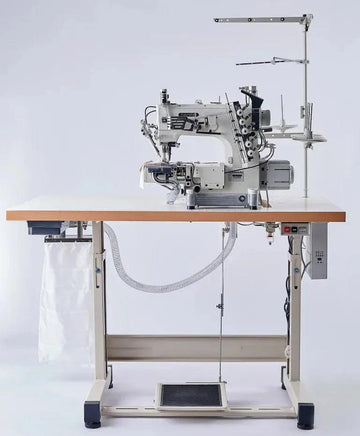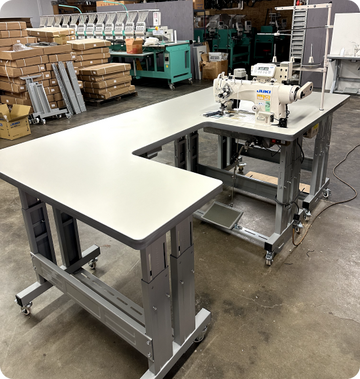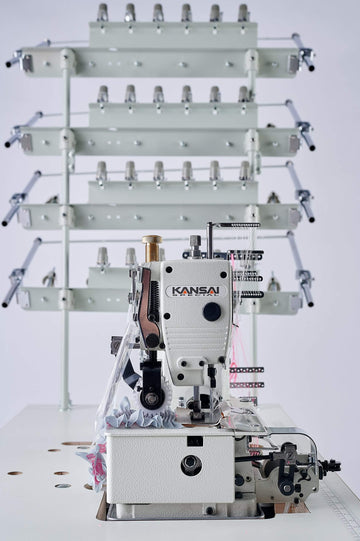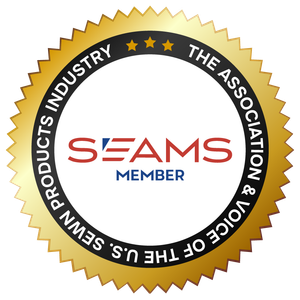High Speed Sewing Machine
High-speed sewing machines are perfect for small workshops and large factories looking to increase their efficiency. Equipped with a powerful motor and strong frame, they provide smooth, low-maintenance operation. Sewing machines can deliver quality even when working at high speed. No wonder they have become widely used in mass production. Brands like Juki or Kansai have engineered high-speed sewing machines for longevity and reliability, delivering smooth performance in industrial settings. Finding the right equipment shouldn’t be a problem, regardless of your experience behind the needle.
40+ Years of Trust
Empowering top manufacturers since 1981
KANSAI Distributor
Best specialized machines & support
Lifetime Warranty
On all PRIZZI custom sewing tables
Quality Control System
Rigorously tested sewing tables for durability
Industrial CoverStitch Machine NR9803GALK-UTA-7/32 (5.6 mm)
Industrial Flat-bed Sewing Machine NL-5801G-UTAB
Industrial Flat-bed Sewing Machine NW-8803GD-UTE-7/32 (5.6 mm)
Industrial Flat-bed Sewing Machine NW-8803GD-UTE-1/4 (6.4 mm)
Industrial CoverStitch Machine W3562P-01GX364B
Industrial Flat-bed Sewing Machine NL-5801G
Industrial Overlock Sewing Machine M922-02X250-24
Industrial CoverStitch Machine WT664P-35BCX356/FT540/UT442
Industrial CoverStitch Machine WT664P-01GBX364/UT344/PT
Industrial Overlock Sewing Machine EXT3216H-A05/535K-5X5
Industrial CoverStitch Machine NW-8803GEMK-E/DM 7/32
What is a High-Speed Sewing Machine?
A high-speed sewing machine is designed for high-speed operations. Unlike a traditional sewing machine, it can create thousands of stitches per minute, which makes it perfect for mass production.
Read moreWhat is a High-Speed Sewing Machine?
A high-speed sewing machine is designed for high-speed operations. Unlike a traditional sewing machine, it can create thousands of stitches per minute, which makes it perfect for mass production.
To operate at high speed, a sewing machine features a powerful motor, durable components, and strong frames that can reduce vibration. What’s good: it can create quality stitches on lightweight and heavyweight fabrics. Considering the increased pressure, it requires frequent maintenance to ensure smooth performance. High-speed sewing machines focus on efficiency in industrial and commercial settings where time plays a critical role.
Types of High-Speed Sewing Machines
Designed for high-speed operations, sewing machines can serve different purposes. Domestic high-speed sewing machines are designed for basic tasks on light fabrics. They are more flexible and easier to use. Industrial high-speed sewing machines differ from domestic machines in size, strength, and functionality. They create quick stitches even on the heaviest materials like leather, canvas, and denim. Commercial high-speed sewing machines are built for businesses that require continuous production. Unlike domestic models, they are optimized for high-volume output with minimal downtime.
Specialized models usually have limited functionality, with the focus on the specific task. Straight stitch machines create basic stitches, such as seaming, topstitching, and hemming. Overlock machines trim fabric edges and create clean seams in garments. Buttonhole and button sewing machines create holes for attaching buttons, mainly on thick fabrics. Considering your domestic or industrial needs, you need to pick the best high-speed sewing machine with the right functionality.
Key Features of High-Speed Sewing Machines
Nowadays, you can find some excellent high-speed sewing machines from Juki, Pegasus and other top brands. All of them are designed to complete certain tasks. The key features include:
-
Stitching speed: High-speed sewing machines can create from 3,000 to 7,000 stitches per minute. The speed can be adjusted to the type of work you wish to do and the fabric you are planning to use.
-
Motor power and durability: Industrial sewing machines have more powerful motors for intensive use at high speed. Robust and resistant motors allow the machine to start and stop sewing instantly, without any damage.
-
Needle types and compatibility: High-speed sewing machines are compatible with different types of needles to suit various projects. They support thick needles for leather and thin needles for delicate fabrics.
-
Quality build and stability: Sewing machines feature strong metal frames and robust construction to reduce vibrations and withstand continuous operations. Their quality build ensures smooth stitching at high speed, which makes them reliable for both industrial production and commercial projects.
For example, high-speed sewing machine proves to have all these features. Increased efficiency offers a better output, especially in industrial settings.
Benefits of Using High-Speed Sewing Machines
High-speed sewing machines can produce thousands of stitches per minute, allowing small workshops and large factories to complete large projects in less time. Consistent stitch quality and increased productivity can be achieved through high speed, which can be adjusted to specific fabrics and project needs. Despite speedy operations, the risks of errors are minimized. What’s good is that every high-speed sewing machine can handle heavyweight fabrics like denim, canvas, or leather. Domestic machines can’t handle this type of fabric, especially at low speeds.
High-Speed Sewing Machine Needles
When using a sewing machine at high speed, you need to install the right needle. This detail is crucial for ensuring smooth performance without needle breakage. To make the right choice, you need to consider the type of fabric and its weight. The main high-speed sewing machine needles include:
-
Universal needles are the most common needles, usually provided in a starter set for the sewing machine.
-
Ballpoint needles are more rounded to use with knit and stretch fabrics.
-
Sharp needles don’t puck and produce even stitches on woven fabrics.
-
Top stitch needles can handle heavy top stitching thread on different types of fabrics.
Stretch, embroidery, and quilting needles can also help sewing machines complete special tasks at high speed. The wrong choice can cause damage to fabrics and create loose or uneven stitches.
Price of High-Speed Sewing Machines
The price of high-speed sewing machine depends on the model you choose. Domestic machines cost less than industrial ones due to different construction and functionality. Needle feed, speed controls, stitch programs, servo motors, and other built-in features have a direct impact on the final cost. Materials and build quality determine the machine’s durability and lifespan.
Entry-level machines may cost between $150 and $500. The cost of heavy-duty industrial machines may exceed $10,000, depending on automation, functionality, and specialized features.
Choosing the Best High-Speed Sewing Machine
Finding the right type of high-speed industrial sewing machine requires you to consider different factors. These include:
-
Choose the machine that meets your domestic or industrial needs. High and low duty require different construction and functionality.
-
Ensure the machine can handle the fabrics used in your production process.
-
Look for a machine of a suitable size to fit your space.
-
Select a trusted brand with a good reputation on the market.
-
Ensure the manufacturer provides a warranty for one year or longer.
Look for a domestic, industrial, or commercial high-speed sewing machine within your budget. Find a decent quality for as much money as you have.
Where to Find High-Speed Sewing Machines for Sale
Finding high-speed sewing machines shouldn’t be a problem in South El Monte, Los Angeles, California. You can always make a purchase on the manufacturer’s official website or visit the offices of local dealers to check the available models in person. Physical stores can directly help with setup and urgent repairs. To check the broad selection and compare prices from different brands, check out online marketplaces such as Amazon and eBay that keep their offering constantly updated. Buyers should carefully assess the product specifications, warranty terms, and return policies to reduce potential risks.
Conclusion
Looking for a high-speed sewing machine for sale is the right decision if you need to speed up your production line without losing quality. With the variety of brands on the modern market, making the right choice shouldn’t be hard. Consider your project needs and the fabrics you are planning to use before making a purchase. Check out the machine’s construction, features, and warranty terms. Contact manufacturers and local dealers to buy a sewing machine that delivers excellent performance at high speed.
Read less- Featured
- Best selling
- Alphabetically, A-Z
- Alphabetically, Z-A
- Price, low to high
- Price, high to low
- Date, old to new
- Date, new to old













